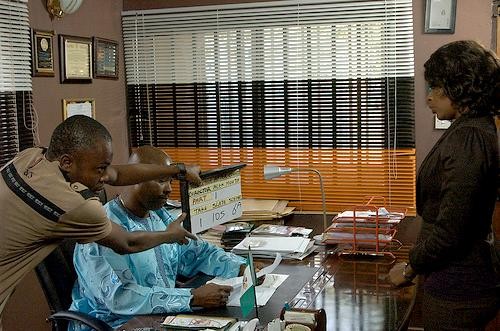
A new civic education film from the Youngstars Foundation asks Nigerians the question, “Aftercount, I Vote Wetin?” (“I Voted, Now What?”). The film, released in 2012, encourages Nigerian youth to stay involved in the political process between elections.
Youngstars Foundation is a Nigerian non-profit organization of youth for youths that has reached tens of thousands of youth across Nigeria through community presentations, a popular TV program and civic education films.
The film, which was produced with technical and financial assistance from USAID and the U.K.'s Department for International Development (DFID), features two Nigerian entertainment stars, Ali Nuhu and Lilian Esoro, and a popular Nigerian musician, Jeremiah Gyang. The actors and crew, including director Alex Mouth, donated their time for this project.
Esoro said she worked pro bono because she wanted youth “to learn that it’s actually easy to communicate with the people they voted into power because their votes actually count.”
The film tells the story of Jairo, who is motivated to take action when his sister is injured in an accident while carrying water home across a dangerous intersection. Jairo lobbies his state representative to address the problem of access to water in his community and learns important lessons about cooperation and the power of citizens to create positive change.
Gyang wrote the movie’s theme song, which was released to radio stations across Nigeria to promote the film. Youngstars released an accompanying handbook to help youth activists promote discussion among viewers.
The film has spurred a number of youth to action. One young man from Ebonyi state, Obinna Odewe, watched the film and was inspired to start a petition to have electricity meters installed in homes. Up to that point, the Power Holding Company of Nigeria (PHCN) charged customers based on usage estimates, and citizens were often overcharged.
“What I wanted to do was mobilize young people, and then we go to PHCN office and demand they establish the meters in a very violent way. But after I watched the movie, I decided to write against PHCN instead,” he said.
Odewe wrote to the Nigeria Union of Journalists, the Nigerian Bar Association and the media, and his petition was published in a number of places.
“So when PHCN saw all of these publications and the letters, they became panicky and started installing the meters in the state. Now most people have the meters installed,” said Odewe.
“I Vote Wetin?” is the second collaboration between USAID, DFID and the Youngstars Foundation. The first film, “My Vote Fit Change Naija,” (“My Vote Can Change Nigeria”), highlighted the importance of voting in elections and reached an estimated 45 million Nigerians around the country and abroad through social networking sites, television broadcasts, and youth-initiated viewing parties.







Comment
Make a general inquiry or suggest an improvement.